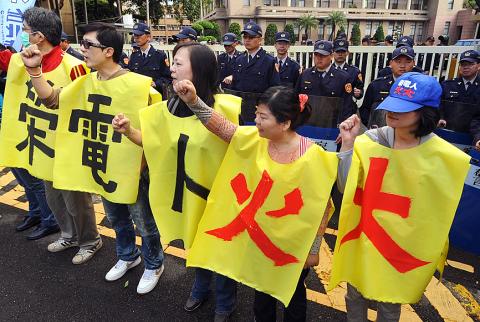Separated by a metal gate, unionists yesterday rallied outside the Executive Yuan against the government’s plans to reform labor insurance and pension systems as Premier Sean Chen (陳冲) and his Cabinet members posed for photographs following their resignation as part of a Cabinet reshuffle.
The government has come up with a program to reform the pension system that would decrease the payout to retirees while gradually increasing the premium paid by workers — which would increase to 19.5 percent of a worker’s salary.
“By paying the retirees less and making people who are still working pay more, the so-called ‘reform’ is taking away the protection that the labor insurance was designed to give us,” National Federation of Independent Trade Unions executive director Chu Wei-li (朱維立) said.

Photo: Liao Chen-huei, Taipei Times
“It’s unfair that the officials who came up with a reform plan that benefits big corporations while exploiting workers are now promoted to higher positions,” he added.
Chu said he was referring to Vice Premier Jiang Yi-huah (江宜樺), who is to take over the premiership on Feb. 18, and Minister Without Portfolio Kuan Chung-min (管中閔), who is to become the head of the Council for Economic Planning and Development.
Chuang Fu-kai (莊福凱), chairman of the Taoyuan County Confederation of Trade Unions, who has worked for over 30 years and is near retirement, criticized the reform proposal.
“Under the current system, I could lead a decent life in retirement with the retirement payout from the labor insurance,” Chuang said. “It’s upsetting that the government is cutting my payouts while at the same time asking my children to pay more.”
Huang Shih-ting (黃仕庭), a 26-year-old worker, said the reform plans were “robbing money from young workers from two sides.”
“We are to pay a higher premium, but when the payouts for our parents are cut, we will have to provide more money to our parents,” he said.
Chu said that following the official announcement of the reform plan, business leaders urged the government to cut the portion of an employee’s retirement pension shouldered by the employer, adding that it would make it hard for businesses to survive with such a heavy burden.
“Why would they run businesses in China where the employer’s burden is even heavier?” Chu said.
He said that according to the current measure, 8 percent of an employee’s monthly salary would go to the fund for their pensions.
The 8 percent premium is divided into three portions; that the employer pays 70 percent, the employee pays 20 percent, while the government pays 10 percent.
“In China, 20 percent of an employee’s salary is to be paid as premium of labor insurance and it’s fully paid by the employer,” Chu said.
The unions urged the government to fill the financial hole in the labor insurance system by raising corporate taxes, instead of getting the money from the employees.

The High Prosecutors’ Office yesterday withdrew an appeal against the acquittal of a former bank manager 22 years after his death, marking Taiwan’s first instance of prosecutors rendering posthumous justice to a wrongfully convicted defendant. Chu Ching-en (諸慶恩) — formerly a manager at the Taipei branch of BNP Paribas — was in 1999 accused by Weng Mao-chung (翁茂鍾), then-president of Chia Her Industrial Co, of forging a request for a fixed deposit of US$10 million by I-Hwa Industrial Co, a subsidiary of Chia Her, which was used as collateral. Chu was ruled not guilty in the first trial, but was found guilty

‘DENIAL DEFENSE’: The US would increase its military presence with uncrewed ships, and submarines, while boosting defense in the Indo-Pacific, a Pete Hegseth memo said The US is reorienting its military strategy to focus primarily on deterring a potential Chinese invasion of Taiwan, a memo signed by US Secretary of Defense Pete Hegseth showed. The memo also called on Taiwan to increase its defense spending. The document, known as the “Interim National Defense Strategic Guidance,” was distributed this month and detailed the national defense plans of US President Donald Trump’s administration, an article in the Washington Post said on Saturday. It outlines how the US can prepare for a potential war with China and defend itself from threats in the “near abroad,” including Greenland and the Panama

DEADLOCK: As the commission is unable to forum a quorum to review license renewal applications, the channel operators are not at fault and can air past their license date The National Communications Commission (NCC) yesterday said that the Public Television Service (PTS) and 36 other television and radio broadcasters could continue airing, despite the commission’s inability to meet a quorum to review their license renewal applications. The licenses of PTS and the other channels are set to expire between this month and June. The National Communications Commission Organization Act (國家通訊傳播委員會組織法) stipulates that the commission must meet the mandated quorum of four to hold a valid meeting. The seven-member commission currently has only three commissioners. “We have informed the channel operators of the progress we have made in reviewing their license renewal applications, and

A wild live dugong was found in Taiwan for the first time in 88 years, after it was accidentally caught by a fisher’s net on Tuesday in Yilan County’s Fenniaolin (粉鳥林). This is the first sighting of the species in Taiwan since 1937, having already been considered “extinct” in the country and considered as “vulnerable” by the International Union for Conservation of Nature. A fisher surnamed Chen (陳) went to Fenniaolin to collect the fish in his netting, but instead caught a 3m long, 500kg dugong. The fisher released the animal back into the wild, not realizing it was an endangered species at